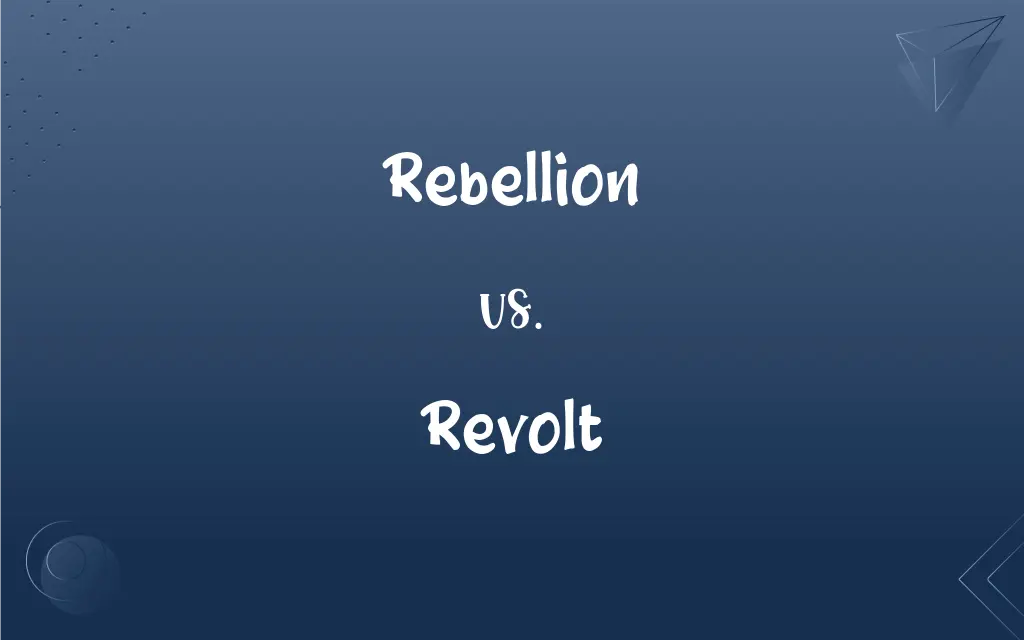Rebellion vs. Revolt: What's the Difference?
Edited by Aimie Carlson || By Janet White || Published on December 20, 2023
Rebellion is an organized resistance against authority or government, often prolonged; revolt is a sudden uprising or violent expression of dissent.

Key Differences
Rebellion often implies a prolonged and organized struggle against a system or authority, aiming for significant change or overthrow. Revolt, by contrast, is typically a more immediate, spontaneous reaction to oppression or dissatisfaction, not necessarily as structured as a rebellion.
In rebellion, there's usually an element of planning and a defined objective, often political or social. Revolt, however, might lack a clear end goal or structured leadership, arising more from immediate frustration or anger.
The scope of rebellion is generally broader and more strategic, potentially involving large groups and sustained actions. Revolt tends to be more localized and short-lived, reflecting a burst of collective discontent.
Historically, rebellions have led to significant socio-political changes or even revolutions. Revolts, while they can spark broader movements, are often quelled more quickly and might not result in substantial change.
A rebellion can morph into a full-fledged movement or war, underpinning a broader societal shift. In contrast, a revolt, due to its spontaneous nature, may dissipate without leaving a lasting impact.
ADVERTISEMENT
Comparison Chart
Duration
Typically prolonged
Often short-lived
Organization
Highly organized
Spontaneous, less structured
Goals
Clear, often political or social
May lack clear goals
Scale
Broader, can be nationwide
Usually localized
Impact
Can lead to major changes
Often results in less significant change
ADVERTISEMENT
Rebellion and Revolt Definitions
Rebellion
A systematic defiance against established order or governance.
The rebellion in the dystopian society aimed to overturn the oppressive regime.
Revolt
An act of violent or non-violent resistance or protest.
The workers’ revolt against unfair labor practices garnered wide support.
Rebellion
An organized, prolonged effort to resist authority or change a system.
The American Revolution was a historic rebellion against British rule.
Revolt
A spontaneous uprising against authority or conditions.
The people’s revolt was triggered by the sudden increase in taxes.
Rebellion
A struggle for autonomy or self-determination against control.
The colony’s rebellion was driven by the desire for independence.
Revolt
A sudden refusal to accept authority or comply with norms.
The student revolt challenged the outdated school policies.
Rebellion
A movement against a ruling power or prevailing norms.
The artist's work was seen as a rebellion against traditional art forms.
Revolt
A rapid and often unexpected reaction to oppression or injustice.
The community's revolt against the new law was unexpected but fierce.
Rebellion
A collective action seeking to overthrow or reform a political system.
The rebellion gained momentum as more citizens joined to demand democratic reforms.
Revolt
A break from established order due to discontent or anger.
The revolt in the city was a clear sign of the public's dissatisfaction.
Rebellion
Open, armed, and organized resistance to a constituted government.
Revolt
To attempt to overthrow the authority of the state; rebel.
Rebellion
An instance of this.
FAQs
What drives a rebellion?
A rebellion is often driven by a desire for political, social, or economic change.
How long does a revolt typically last?
Revolts are usually short-lived, often dissipating after the immediate issue is addressed or suppressed.
Are rebellions always violent?
Not necessarily. Rebellions can be either violent or non-violent, depending on the tactics chosen by the participants.
Are revolts always spontaneous?
Revolts are generally more spontaneous than rebellions, though some planning may occur.
How do governments typically respond to rebellions?
Governments may respond with negotiation, reform, suppression, or military action, depending on the rebellion's nature and threat.
What is the role of leadership in a rebellion?
Effective leadership is crucial in a rebellion for strategy, coordination, and maintaining momentum.
Can a revolt lead to a rebellion?
Yes, a revolt can escalate into a rebellion if it gains enough support and structure.
Do rebellions always seek to overthrow the government?
While many do, some rebellions aim for significant reform rather than complete overthrow.
Can a single event trigger a rebellion?
Yes, a single event can spark a rebellion, especially if underlying discontent has been simmering.
What are the common outcomes of a revolt?
Outcomes vary but often include temporary disruptions, attention to grievances, or immediate but short-term changes.
Can a revolt be peaceful?
Yes, revolts can be peaceful, such as mass protests or strikes.
Can social media play a role in rebellions?
Yes, social media can be a powerful tool for organizing, spreading information, and rallying support.
Is it legal to participate in a revolt?
Legality varies by country and the nature of the revolt; some forms may be legal, while others could be deemed illegal.
Are revolts effective in bringing change?
Revolts can be effective in highlighting issues and triggering discussions, though they may not always result in long-term change.
How do rebellions end?
Rebellions can end through achieving their goals, negotiation, loss of support, or suppression.
What motivates individuals to join a revolt?
Personal grievances, solidarity with others, and a desire for immediate change can motivate individuals.
Can revolts occur within organizations, not just governments?
Yes, revolts can occur in any hierarchical structure, including businesses, institutions, and organizations.
Do revolts require a large number of people?
Not necessarily; small groups can initiate revolts, though larger numbers may increase impact.
How do rebellions impact society?
Rebellions can lead to significant social, political, and cultural changes, both positive and negative.
Can external factors influence a rebellion?
Yes, factors like international support, economic conditions, and media coverage can significantly influence a rebellion.
About Author
Written by
Janet WhiteJanet White has been an esteemed writer and blogger for Difference Wiki. Holding a Master's degree in Science and Medical Journalism from the prestigious Boston University, she has consistently demonstrated her expertise and passion for her field. When she's not immersed in her work, Janet relishes her time exercising, delving into a good book, and cherishing moments with friends and family.
Edited by
Aimie CarlsonAimie Carlson, holding a master's degree in English literature, is a fervent English language enthusiast. She lends her writing talents to Difference Wiki, a prominent website that specializes in comparisons, offering readers insightful analyses that both captivate and inform.






































































